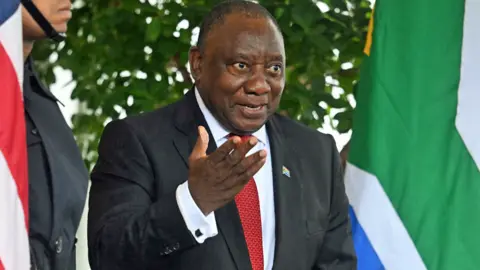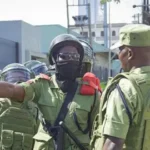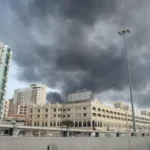In recent weeks, South Africa has witnessed a surge of debate and division over U.S. President Donald Trump’s critical comments about President Cyril Ramaphosa. While some South Africans view Trump’s remarks as a reflection of global politics, others see them as an unwarranted attack that has ignited domestic tensions. This divide underscores the complex relationship between international diplomacy and local perceptions of leadership.
What Did Trump Say?
The controversy began when Donald Trump made publicly disparaging comments about Ramaphosa during a recent interview, questioning South Africa’s leadership and economic stability. Trump’s remarks, which included accusations of corruption and mismanagement, quickly gained traction on social media platforms and news outlets worldwide. Given Trump’s reputation for outspoken criticism, many South Africans were initially skeptical or dismissive. However, as the comments circulated, they sparked widespread discussion domestically.
Public Reactions: Diverging Perspectives
South Africans’ responses to Trump’s comments have been sharply divided, reflecting broader political and social fissures within the country.
Supporters of Ramaphosa View the Remarks as Unwarranted
A significant segment of South Africans, especially those aligned with the ruling African National Congress (ANC), perceived Trump’s comments as unfair and politically motivated. Many argue that Ramaphosa has been making efforts to stabilize the economy and address corruption, despite persistent challenges. Critics within this group contend that Trump’s remarks are part of a pattern of interference or sensationalism aimed at undermining African leadership. Social media campaigns supporting Ramaphosa have emphasized his diplomatic efforts and the importance of respecting South Africa’s sovereignty.
Opponents and Critics Question the Leadership
Conversely, opposition parties, civil society organizations, and some citizens have used Trump’s comments to criticize Ramaphosa’s administration. They argue that the remarks highlight underlying issues of governance and corruption that need urgent attention. Some see Trump’s critique as a reflection of broader concerns about South Africa’s economic management and political stability. This faction emphasizes the importance of accountability and has called for investigations into allegations of corruption involving government officials, including those linked to Ramaphosa.
Media and Political Discourse
The media landscape in South Africa has played a crucial role in shaping public opinion. Certain outlets have amplified Trump’s statements, framing them as a wake-up call about the state of leadership in Africa. Others have dismissed the comments as external interference and emphasized the need for South Africans to focus on domestic solutions. Politicians have also seized the opportunity to rally support or critique their opponents, deepening the political divide.
International Context and Its Influence
South Africa’s divided response to Trump’s remarks is also influenced by its broader international relations. While many South Africans pride themselves on sovereignty and non-interference, some are wary of foreign interference in internal affairs. Trump’s reputation for unpredictability and aggressive rhetoric has further complicated perceptions, with some viewing his comments as part of a pattern of destabilizing influence, while others see them as mere noise in a complex geopolitical landscape.
Conclusion
The division among South Africans regarding Trump’s mauling of Ramaphosa exemplifies how international statements can ignite domestic debates. While some see Trump’s comments as unjustified attacks that should be dismissed, others interpret them as an indication of deeper issues needing attention. As the country continues to navigate its political and economic challenges, the way South Africans respond to such external critiques will influence their collective approach to leadership, governance, and sovereignty. Ultimately, this controversy underscores the importance of internal unity and constructive dialogue in addressing South Africa’s future.
Email Us on editorial@nnafrica.com













